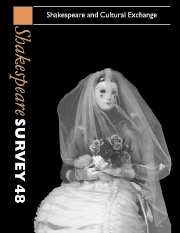Book contents
- Frontmatter
- Shakespeare Translation as Cultural Exchange
- Shakespeare, Theatre Production, and Cultural Politics
- ‘Amphitheaters in the Body’: Playing with Hands on the Shakespearian Stage
- ‘Shakespur and the Jewbill’
- Wilhelm S and Shylock
- Pilgrims of Grace: Henry IV Historicized
- Holy war in Henry V
- Hamlet and the Anxiety of Modern Japan
- Hamlet’s Last Words
- Venetian Culture and the Politics of Othello
- ‘My Music for Nothing’: Musical Negotiations in The Tempest
- The Tempest and Cultural Exchange
- Caliban and Ariel Write Back
- Shakespearian Rates of Exchange in Czechoslovakia 1945–1989
- ‘Are you a Party in this Business?’ Consolidation and Subversion in East German Shakespeare Productions
- The Martyred Knights of Georgian Shakespeariana
- Shakespeare Performances in England, 1993–1994
- Professional Shakespeare Productions in the British Isles, January – December 1993
- 1 Critical Studies
- 2 Shakespeare’s Life, Times, and Stage
- 3 Editions and Textual Studies
- Books Received
- Index
Shakespearian Rates of Exchange in Czechoslovakia 1945–1989
Published online by Cambridge University Press: 28 March 2007
- Frontmatter
- Shakespeare Translation as Cultural Exchange
- Shakespeare, Theatre Production, and Cultural Politics
- ‘Amphitheaters in the Body’: Playing with Hands on the Shakespearian Stage
- ‘Shakespur and the Jewbill’
- Wilhelm S and Shylock
- Pilgrims of Grace: Henry IV Historicized
- Holy war in Henry V
- Hamlet and the Anxiety of Modern Japan
- Hamlet’s Last Words
- Venetian Culture and the Politics of Othello
- ‘My Music for Nothing’: Musical Negotiations in The Tempest
- The Tempest and Cultural Exchange
- Caliban and Ariel Write Back
- Shakespearian Rates of Exchange in Czechoslovakia 1945–1989
- ‘Are you a Party in this Business?’ Consolidation and Subversion in East German Shakespeare Productions
- The Martyred Knights of Georgian Shakespeariana
- Shakespeare Performances in England, 1993–1994
- Professional Shakespeare Productions in the British Isles, January – December 1993
- 1 Critical Studies
- 2 Shakespeare’s Life, Times, and Stage
- 3 Editions and Textual Studies
- Books Received
- Index
Summary
Thanks to Karl Marx the value of Shakespeare was never called into question even by the most dogmatic Communists in Czechoslovakia and other countries of the former Soviet Bloc. Practically everybody, including the Stalinist cadres, knew about the high esteem in which Shakespeare had been held by Marx and his family. Marx’s and Engels’s appreciative views of Shakespeare and the whole age of the Renaissance were available in their collected works and special volumes devoted to Marxist theory of art. Yet while the value of Shakespeare remained undisputed, his rates of exchange were fluctuating considerably and sometimes quite dramatically with the changes in political climate. My reference to Malcolm Bradbury’s novel Rates of Exchange may seem trendy but I believe that it can be both amusing and illuminating. At least I can promise that my story will be nearly as rich in ironies and paradoxes as Bradbury’s East European fiction.
The first paradox consists of the fact that theatres were rather generously subsidized by Communist authorities but, at the same time, more or less strictly controlled. In the course of permanent negotiations between political power and artistic creativity, a precarious sociocultural contract was being reached, giving the theatres economic freedom in exchange for political loyalty. Theatres could engage in artistic experiments released from commercial pressures on condition that they put up with political control. This control tended to be oppressive in the periods of revolutionary fervour and severity but could become quite challenging for directors, actors, and playwrights during the spells of political thaw.
- Type
- Chapter
- Information
- Shakespeare Survey , pp. 163 - 170Publisher: Cambridge University PressPrint publication year: 1996

